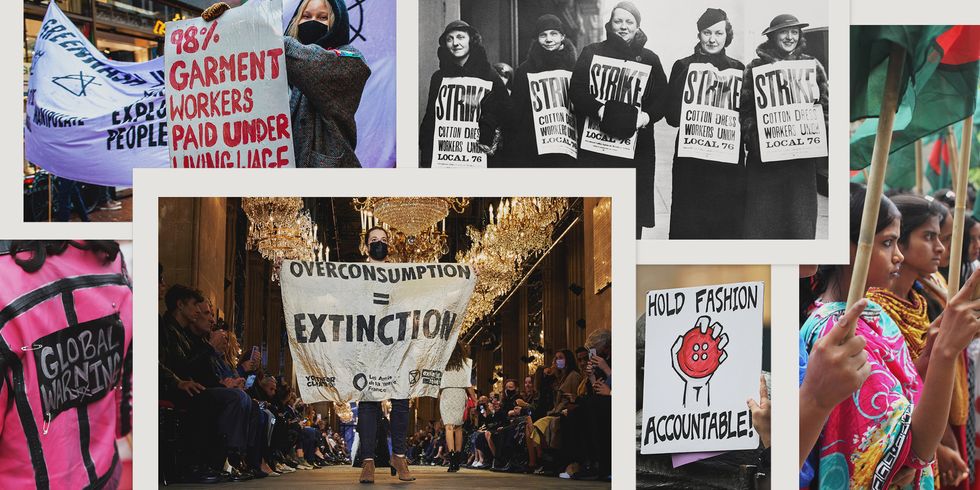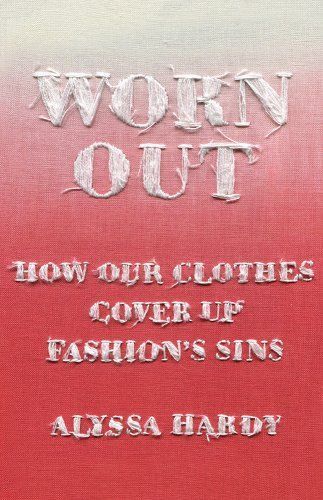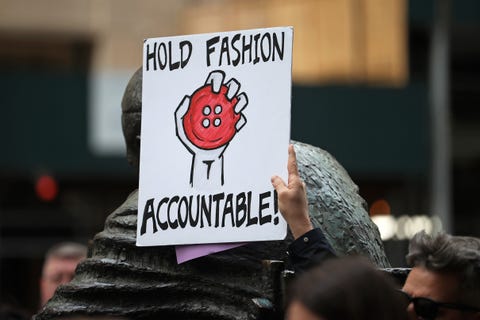Alyssa Hardy on Greenwashing, Garment Worker Rights, and Her New Book Worn Out
Style Points is a weekly column about how fashion intersects with the wider world.
Alyssa Hardy has spent her career reporting on the less glamorous side of the fashion industry, whether it’s the environmental impact of fast fashion or the fight for garment workers’ rights. With her first book, Worn Out: How Our Clothes Cover Up Fashion’s Sins, out today, she expands on those topics, writing about how overconsumption has driven a whole host of fashion crises. I spoke with Hardy about some of the hot-button issues covered in her book, and how we can do our part to hold the industry accountable. Here are excerpts from our conversation.
You write about growing up with fast fashion. But the older model almost seems quaint, because now there are companies turning out new stuff every week or maybe even every day, and in much larger quantities. What’s changed about the landscape, and what’s become worse?
“Quaint” is 100 percent the way it feels when you look back on it. They were certainly doing way more seasons than was good for the amount of clothing they were putting out, but it wasn’t the 104 [pieces] that some are putting out now. It is an entirely different beast, and it’s even worse in the sense that the quality of the clothing has significantly gone down. And the demands on the workers are more significant, because if they’re getting paid at piece rate, they need to be making more in order to take home a certain amount of money.
Gen Z is more concerned with sustainability, but they’re also the primary drivers of these newer fast-fashion brands. We’re in this weird moment where younger people are more environmentally aware, but their consumption habits don’t match up with that completely. Can you talk about that paradox?
It’s one of those things where both can be true. They absolutely seem to, at least more vocally, care about the impact of their own actions and the actions of the companies putting out all these clothes, but then at the same time, they’re being fed marketing and pressure to keep up and to buy new clothes and trends, more than we could have ever even imagined. But I do think that younger people are willing to learn and not shut it down and say, “Oh, that doesn’t have anything to do with me.” They seem to understand that it does have something to do with them, because they’re going to have to deal with the impact of it.
I’ve seen a lot of debate about the ethics of consuming sustainably, but also affordably. And then when you add in size inclusion, a lot of sustainable brands are not just expensive, they don’t have a big size range. When people ask, “How are we supposed to shop sustainably?” what do you tell them?
I have a couple ways that I address this. Especially when it comes to things such as sizing and adaptability, fast fashion does it better. And so it becomes a very difficult conversation to have. But what I always try to say is that consuming is not the only way to change things. Yes, using your dollar to put pressure on brands is great, but I don’t believe that is the only way, or really the biggest way, that we can enact change in fashion. Understanding how much these brands don’t want you to make noise about what they do is just as powerful as saying, “I’m not going to buy from you anymore.” It’s just making sure that you understand that there’s a petition you can sign, a tweet you can send, legislation that you can call your representative to support.
Speaking of legislation, bills like the Fashion Act and the Fashion Workers Act are now being proposed to regulate the industry from the outside, as opposed to fashion trying to regulate itself. Do you think that that’s what it will take to get fashion to be more ethical?
I think the only way to hold the brands accountable to their promises is to make it impact them in a negative way if they don’t [comply]. The fashion industry will just keep doing exactly what it’s been doing unless the government steps in and says, “Okay, enough.” Not every piece of legislation is obviously the best, or is necessarily enough to fix things. But I do think it’s a start that we’re seeing so much of it, and I think that could really be the change.
How have you seen greenwashing get more sophisticated over the years?
The worst part that I have seen is using the language that advocates have been pushing as a marketing tool. To say certain things like “accountability” and “transparency,” but then not act on any of those. I think they’ve gotten very clever at figuring out the words that we have been asking for them to use, and for them to actually follow through on…They give you enough information so that you hopefully don’t ask any more questions. And to me that is greenwashing 2.0.
It’s been interesting to watch the revival of labor movements, but we haven’t seen so much progress for garment workers in the global south, who are making a lot of the fast-fashion garments. What can the overall labor movement do to include those workers?
I think it comes down to a couple things. Because in the global majority, there are definitely garment unions, but they are not always necessarily protected by the brands. When these manufacturers are having issues in their factories, and then the brands are not going in and recognizing their demands or the problems that they’re having, that is something that we need to get straightened out. I think there needs to be so much more pressure on the brands to listen to the unions in Bangladesh, in Haiti, where all these labor movements are happening, but the brands are just looking away and saying it’ll blow over.
I also think that brands historically have been able to get away with these violations without people really noticing. If they decide to shut down a factory for whatever reason, they’ve been able to just move on from that. And I am starting to see, from a global perspective, this labor movement pick up steam. I think because they’re noticing that it’s being recognized around the world.
You also talk about the lack of a real #MeToo movement in fashion. Perhaps there was one for models to some extent, but not for the rank-and-file workers. Why do you think that moment didn’t come to pass in the same way that it did in Hollywood?
I think there is a visibility issue. These workers have not been historically respected by the fashion industry at large, and they deserve the same amount of respect as a model, a celebrity, an editor, anybody. And we don’t do that because of the type of work they’re doing, which is just absurd.
Sexual harassment and abuse in these factories is rampant. Several women that I talked to, even some that didn’t end up being in the book, pretty much all of them had a story of harassment. And yet for some reason, these women’s stories are just not [considered] as big of a deal. There’s just a level of respect for their stories that needs to grow. And I think that it is, as they continue to speak up more, [like] the people that are working in the factories in Los Angeles, with their win with SB62. As more and more workers decide to come forward, and it’s not dangerous to do that in a lot of ways, I think that voice as a collective gets louder. And hopefully that can be part of the change.
What kinds of preconceptions do you think still exist about fashion as a serious topic to report on that may be keeping some of these stories from being told?
I think there is something to do with the fact that fashion is just so much a part of everyone’s lives. And it’s like, “What is the big deal with this shirt? It’s just a shirt.” That is such a huge hurdle to get over, as someone who wants to talk about it in a more serious way. Because obviously I can understand that it is just a shirt in a lot of ways. However, as we know, working in this industry and reporting on it, it’s so much more than just a shirt.
This interview has been edited and condensed for clarity.






